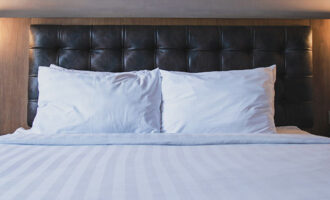Have you been tossing and turning all night trying to sleep? Well, join the club. Most adults face some difficulties sleeping right away, which could be due to many things. It could be because of stress, overthinking, or even might be because your bed is not comfortable enough.
Whichever the reason is, losing sleep is one of the worst things that can happen to anyone, mainly because it affects how we feel, interact, and function for the rest of the day.
Did you know that the quality of your sleep is influenced by your bedroom? Scientific studies and sleep experts have discovered that our surroundings have genuine and measurable effects on sleep, from temperature to light and more.
If you’re constantly sipping coffee because of sleepless nights, it’s possible that your bedroom is to blame. Changing your nighttime routine, as well as your bedroom decor, might have a significant impact on your sleep quality.
How to Make Your Bed Comfortable
To get the best of your nighttime sleep, you might want to make your bedroom environment comfortable enough for you to sleep right away. Here are some of the methods you can try:
Choose a Comfy Bedding
Some fabrics such as wool, silk, cotton, linen, and bamboo have a quality of moisture-wicking. This means that they absorb the extra moisture to maintain your cool body temperature. While synthetic satin and polyester, for example, can actually retain moisture and keep you warm.
You do not need to buy the most expensive types of sheets, but the fibers in your bedding should feel good on your skin and help you feel cozy and sleepy. If the weather gets very hot in the summer and very cold in the winter where you live, you should consider utilizing different bedding (thick in the winter and thin in the summer) to help you sleep more comfortably.
Duvets and comforters make your sheets comfier as they add extra coziness. and in case you sleep hot, the cooling material these sheets are made of can help you avoid night sweats.
Get a Comfortable Mattress
Your choice of mattress is an essential component of a good night’s sleep. Mattresses are recommended to be replaced every five to seven years, according to the Better Sleep Council, and whenever the bed is not comfortable anymore, according to Consumer Reports.
Generally, people use their beds for about ten years, however, if your mattress has deep curves or causes uncomfortable pressure spots, it’s time to replace it. Keep in mind that springs wear out faster than foams, memory foam mattresses and latex will live longer than beds with springs.
Always Keep Your Pillow Fresh
Pillows are also essential for comfort and should be changed more frequently than mattresses. Poly-fill and down alternative pillows might also need to be replaced every couple of years.
While buckwheat, latex, and memory foam pillows might last a couple of years longer with proper maintenance.
Neck pain, back pain, and pressure points can all be caused by a pillow that is too thick, too flat, or does not provide appropriate cushioning anymore. So, if your mattress is in good shape but you’re experiencing neck pain, it’s possible that your pillow is to blame.
Turn Off the TV
For many people, sleeping while the TV is on is soothing and helps them fall asleep faster, however, studies have shown that televisions actually prevent people from sleeping properly and might affect their sleep quality.
The motion and sound stimulate your thoughts, while the light stops your body’s internal clock from properly regulating sleep. In infants and children, watching television before bed is linked to a variety of sleep issues, such as anxiety and resisting bed.
To get the best of your night’s sleep, you can choose some activities that help you rest, such as reading, taking a warm bath, or stretching.
Keep Your Room As Dark As Possible
Your Suprachiasmatic Nucleus, which is located in the hypothalamus, is responsible for controlling your internal clock, which is based on light signals received through your optic nerves. When light is sensed, it causes melatonin to be delayed, cortisol to be produced, and your body temperature to be boosted, causing you to become awake.
Before going to bed, switch off or cover any electronic lights in your room. If your windows let in unwanted light, blackout window coverings may be worth investing in to keep your bedroom dark.
Cool Off Your Bedroom
Warmer temperatures have a significant impact on sleep quality. According to most sleep specialists, the ideal temperature range for rest is between 60 and 72 degrees Fahrenheit.
You can try different thermostat settings to see what feels most comfortable to you, as everyone’s comfort level differs. If you run hot and your partner gets cold fast, it would be a good idea to use various comforter weights so you can both have a good night’s sleep.
Block All Annoying Noises
While trying to fall asleep, you might hear some annoying noises that could make you lose sleep or wake up a lot in the middle of the night. You can try using earplugs or a white noise machine to clear the annoying noises and help you sleep soundly.
Keep Your Room Clean and Organized
A messy or untidy environment can stop you from drifting off and feeling comfy. Spending only a few minutes a day tidying and making sure everything has a place to go may make a tremendous difference.
So, before going to sleep, make sure to clean up the bedroom or at least remove the clutter. Sleeping in an organized bedroom can help improve your sleep quality.
Healthy Bedroom Habits to Improve Sleep Quality
To make sure you are sleeping in a comfortable and relaxing environment, you might want to consider keeping your pillowcases and sheets fresh and clean. Especially if you are a pet owner and your pet sleeps in your bed sometimes.
You might as well want to consider making your bed when you wake up in the morning. Research shows that people who walk in their bedroom while the bed is cleaned make them feel cozier and fall asleep even faster.
Another thing that you can try is spraying soothing fragrances around your room before you sleep. Essential oils such as lavender can improve your sleeping quality and help soothe you as well as helping you wake up feeling more refreshed in the morning.
Everyone has their own sleeping preferences, some will feel better sleeping on a thick mattress while others might feel that the medium-thick mattress suits them best. Keep on trying different sleeping methods to find out what makes you feel most comfortable.
Did you like it?4.6/5 (22)





